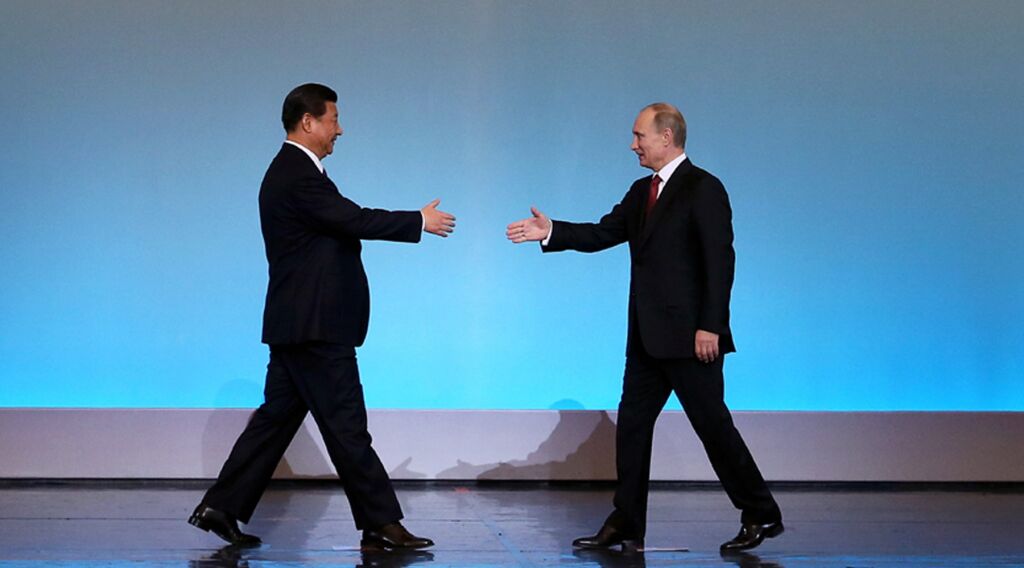
Can President Trump Fracture the Russia-China Power Bloc?
The election of United States President Donald Trump generated optimism among some pundits that he may be able to ease strained U.S.-Russia relations. The relations had taken a turn for the worse in 2014 after Russia unilaterally annexed Ukraine’s Crimean Peninsula and sent its military into eastern parts of the country to support pro-Russian insurgents. The U.S. and other Western nations responded by levying sanctions on Russia. President Vladimir Putin determined that if Western powers were punishing and attempting to isolate Moscow, Russia would instead look to the East, and the Eastern powers welcomed Russia.
In “Asia Stands With Putin,” Trumpet editor in chief Gerald Flurry said that while the Obama administration was trying to isolate Russia, “at least 3 billion people disagree” with the attempt. These were the peoples of China and other Asian nations. Mr. Flurry wrote:
Russia’s bullying of Ukraine and takeover of Crimea have exposed Vladimir Putin as the authoritarian dictator that he is. These moves have Eastern Europeans quaking with fear and the Western world deeply concerned. But what about China and India? These Asian powerhouses have made clear that they support Putin.
Now, three years after the annexation of Crimea, the Russia-China relationship remains robust. But analysts, such as Cato Institute senior fellow Doug Bandow, say that President Trump could and should seek to break that Russia-China bond and pull Russia closer to America.
“If Donald Trump succeeds in improving relations with Russia, he would have the salutary side effect of discouraging creation of a common Russo-Chinese front against the United States,” Bandow wrote. He said that Trump should follow the model of Richard Nixon’s China policy. In the 1950s and 1960s, the Soviet Union and China were locked in fierce competition to lead the Communist world. Nixon and Secretary of State Henry Kissinger used a model of “triangular diplomacy” to successfully exploit that tension and to create an opening with China. This remarkable accomplishment positioned the U.S. closer to the Soviet Union and to China than the two Asian powers were to each other.
But conditions today are drastically different from those in which Nixon and Kissinger were operating. Writing for the Diplomat on February 23, John Van Oudenaren of the National Defense University’s College of International Security Affairs said that any attempt by Mr. Trump to employ this Nixon-Kissinger model of “triangular diplomacy” would be unsuccessful. This is mainly because the ideological arguments that divided the Soviet Union and China before and during the Nixon era are no longer present. Today, any remaining ideological differences between Moscow and Beijing have been trumped by their common hatred of the United States. Van Oudenaren wrote:
Both countries harbor intense authoritarian nationalist opposition to Western and globalist ideologies, but no longer share the common Marxist-Leninist political orientation that produced the divisive ideological schisms of the Cold War. … Putin and China’s ruling Communist Party have similar views of the threat posed by Western “universal values” such as democracy and human rights. They see “foreign influences,” which they believe have penetrated their societies through globalization, the Internet/social media, and ngos [nongovernmental organizations], as the primary threat to their domestic grip on power. For China and Russian governing elites, these influences are a Trojan horse designed to spark destabilizing “color revolutions” that produce regime change in “non-Western” (i.e. authoritarian) political systems.
He went on to explain that both Russia and China have seen this kind of revolutionary activity happening frightfully close to home. For Russia, it was the 2013–2014 Euromaidan protests in Ukraine. For China, it was Hong Kong’s 2014 Umbrella Revolution.
Both Putin and China’s Xi Jinping view these types of movements as grave threats to their grip on power, and they blame the West for authoring them. Moscow and Beijing view such movements as evidence that America in particular is attempting to destabilize their political systems and undermine their domestic legitimacy. This view guarantees that Russia and China will remain in close partnership.
As Mr. Flurry wrote in 2014, China has “made clear” that it supports Putin’s Russia. That signaled a new phase in the cooperation of these two powerful Asian nations. Despite the change in the U.S. presidency, that cooperation remains strong today. Mr. Flurry wrote that, in light of Bible prophecy, the Russo-Chinese cooperation carries foreboding implications:
These Asian powerhouses have made clear that they support Putin. This is a stunning fulfillment of a biblical prophecy! … When these Asian nations—extremely powerful nuclear-armed countries—begin to show solidarity with each other regarding moves like [Russia’s annexation of Crimea], what does that portend for the world? I tell you it is woe to the world. It will cause many serious problems. And it is going to affect everyone. … It is clear that Ezekiel recorded an end-time prophecy for Russia and China and other powers. This prophecy makes plain that Russia will be the leader of this massive Asian alliance. That is a key to understanding this.
To understand more about the implications of Russo-Chinese cooperation and how it will “affect everyone,” watch Mr. Flurry’s powerful Key of David program “Russia and China Unite.”
